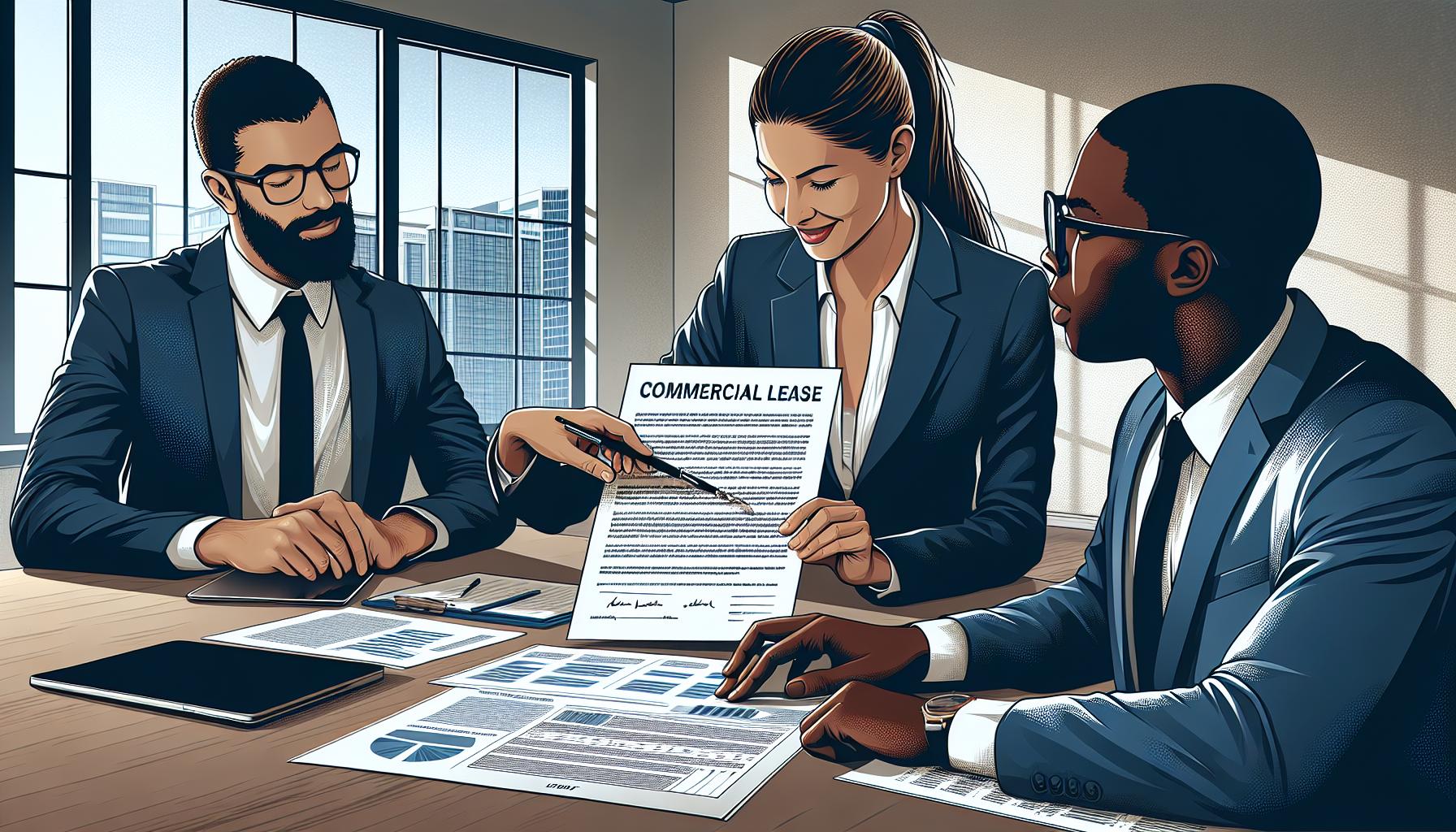Key Takeaways
- Effective lease management involves more than record-keeping; it requires systematic oversight of lease timelines, payments, tenant relations, and compliance.
- Staying organized with key dates, such as renewal deadlines and rent escalations, helps avoid costly mistakes and ensures financial stability.
- Clear lease agreements with updated terms strengthen landlord-tenant relationships and reduce conflicts. Addressing clauses like early termination and maintenance responsibilities ensures mutual understanding.
- Technology simplifies lease management by providing tools for tracking, automation, and centralized storage, saving time and reducing the risk of errors.
- Proactive communication and documentation maintain transparency and help address potential disputes while fostering trust.
- Regular audits and compliance checks ensure leases align with legal standards, mitigate risks, and optimize profitability for long-term success.
Managing commercial leases can feel overwhelming, especially when juggling multiple properties or tenants. Have you ever wondered if there’s a way to simplify the process while staying on top of critical details? From tracking lease terms to handling renewals and compliance, staying organized is key to protecting your investments and avoiding costly mistakes.
I’ve found that effective lease management isn’t just about keeping records—it’s about creating a system that works for you. What if you could save time, reduce stress, and make smarter decisions about your properties? Whether you’re a property owner or a tenant, understanding how to manage leases efficiently can make a big difference in your bottom line.
Understanding Commercial Lease Management
Managing commercial leases involves more than just keeping records of agreements. It requires systematic oversight of lease timelines, payments, tenant interactions, and legal obligations. Staying organized is critical to minimizing errors that could lead to financial losses or legal issues.
Precise documentation is at the core of effective lease management. Tracking key dates, like renewal deadlines or rent escalation periods, helps avoid costly mistakes. For example, missing a renewal window could result in a tenant vacating unexpectedly, while overlooking payment escalations might reduce expected revenue.
Analyzing lease terms contributes to informed decision-making. Understanding clauses, such as maintenance responsibilities or early termination conditions, can help avoid conflicts with tenants. Clear communication regarding these terms assists in maintaining positive relationships and ensuring compliance with agreements.
Technology has streamlined how leases are managed. Digital tools offer reminders, reporting features, and centralized record storage, which simplify complex processes. For instance, using software to calendar critical dates alleviates manual tracking burdens and reduces human error.
Every lease portfolio requires regular evaluation. Reviewing financial metrics, like occupancy rates and lease profitability, ensures alignment with broader property management goals. Consistent monitoring highlights areas requiring modification, such as renegotiating terms or adjusting tenant mix to maximize returns.
What strategies have you implemented to keep your commercial lease management structured and efficient? Reflecting on current processes may reveal opportunities for improvement.
Key Components Of Commercial Lease Management

Focusing on key components of commercial lease management helps streamline property oversight and avoid common pitfalls. Detailed attention to agreements, tenant relationships, and property obligations supports smarter, more effective management.
Lease Agreement Essentials
Clear and concise lease agreements set the foundation for effective management. These documents define financial terms, like rent amounts, payment schedules, and security deposit requirements, alongside operational terms, such as lease duration and renewal options. Provisions for maintenance responsibilities and dispute resolution processes ensure both parties understand their commitments. Have you reviewed your leases recently to confirm they’re up-to-date and legally sound?
Including clauses addressing early termination, subletting conditions, and market-specific legal considerations reduces ambiguities. Regularly updating agreements to reflect regulatory or market changes strengthens their validity and relevance over time.
Tenant Obligations And Rights
Recognizing and documenting tenant obligations minimizes misunderstandings and helps preserve professional relationships. Tenants typically must meet rent payment deadlines, maintain occupied spaces in reasonable condition, and adhere to agreed-upon usage terms. Detailed communication about expectations during lease signing creates accountability.
Tenants also have rights that should be respected, such as privacy, proper notice before inspections, and safe premises. Anticipating tenant needs and fostering transparency can promote trust and reduce dissatisfaction. Are your tenant communication practices helping address these rights effectively?
Landlord Responsibilities
Consistent fulfillment of landlord responsibilities forms the backbone of well-managed properties. Providing a safe, habitable environment and maintaining shared areas are foundational duties. Addressing tenant concerns promptly and ensuring necessary repairs are handled helps avoid escalated issues, like legal disputes or tenant turnover.
Compliance with regulations, such as accessibility and safety standards, protects both landlord and tenant interests. Reviewing insurance policies and emergency protocols regularly keeps properties well-prepared. Are there areas in your property management where improvements could reduce risks or improve tenant satisfaction?
Benefits Of Effective Commercial Lease Management

Effective commercial lease management simplifies operations and strengthens property and tenant relationships. Proper oversight helps reduce risks, improve profitability, and increase asset value.
Minimizing Risks And Avoiding Disputes
Risk management is vital when handling commercial leases. By tracking critical dates like renewals or rent reviews, I avoid costly oversights. Clear documentation of lease terms reduces misunderstandings, offering a solid foundation for tenant agreements. Regular audits of leases help identify potential red flags before they escalate into disputes. How do you currently handle contract compliance and tenant communication to prevent conflicts?
Optimizing Lease Revenue
Efficient lease management maximizes revenue by identifying opportunities for rent adjustments or restructuring terms. I analyze market trends to align lease rates with current demand. Monitoring tenant payment histories allows me to address payment concerns promptly, retaining consistent cash flow. Have you examined how your lease terms impact profitability?
Enhancing Property Value
Strategic lease management adds long-term value to commercial properties. Maintaining updated agreements, handling repairs promptly, and fostering strong tenant relationships create a high-performing asset. I also assess lease terms for flexibility to adapt to economic changes. What steps are you taking to improve the appeal and financial health of your properties?
Challenges In Managing Commercial Leases

Managing commercial leases presents several potential difficulties that can disrupt operations and impact profitability. Addressing these challenges proactively helps maintain smooth property management and effective tenant relations.
Common Issues Faced By Landlords And Tenants
Disagreements over lease terms create friction between landlords and tenants. Miscommunication regarding rent adjustments, maintenance responsibilities, or common area usage often leads to disputes. I find that unclear language in lease agreements or vague clauses about these obligations usually aggravates the problem.
Tracking lease expirations and renewals is another common challenge. Missed deadlines, like failing to initiate lease renewals or providing required notices, can result in unplanned vacancies or tenants overstaying lease periods. I use automated reminders to monitor these dates effectively.
Unpaid rent or late payments negatively affects cash flow. Tenants may struggle during economic downturns, highlighting the importance of transparent discussions about financial challenges. Proactively addressing payment delays leads to better outcomes than punitive actions.
How do you currently address communication breakdowns or missed deadlines? Identifying problem areas in advance can minimize these recurring issues.
Legal And Compliance Hurdles
Staying compliant with lease-related laws is a critical aspect of management. Legal requirements like zoning regulations, safety codes, or accessibility standards often change, and noncompliance can lead to penalties. I recommend frequent consultations with legal professionals to stay informed.
Lease agreements also involve navigating intricate legal terms. Misinterpreting provisions may expose landlords to liability or leave tenants unprotected. Reviewing these documents with legal experts can prevent misunderstandings and litigation.
Managing diverse property portfolios increases the difficulty of compliance. Each jurisdiction may have distinct rules that govern tenant rights or property standards. Organizing documents and conducting regular audits simplifies managing obligations across multiple locations.
Are you confident your current leases align with local laws and tenant protections? Regular reviews are a simple step to avoid costly errors and strengthen operational efficiency.
Tools And Strategies For Better Commercial Lease Management

Efficient commercial lease management requires the right tools and strategies. Using technology and clear practices makes handling leases less time-consuming and more reliable.
Lease Management Software
Lease management software simplifies tracking critical lease information. These tools store data like lease terms, payment schedules, and renewal dates in one place. Automated reminders prevent missed deadlines, while reporting features help identify financial trends or performance issues. Some platforms also provide document storage, making it easier to locate signed agreements or correspondence.
Integrating lease management tools with accounting software improves payment monitoring. This creates a seamless way to handle receivables, reducing errors in tracking tenant payments. Have you considered how automation could save hours spent on repetitive tasks?
Best Practices For Landlords And Tenants
Clear communication between landlords and tenants prevents misunderstandings. Regular updates about lease obligations, maintenance schedules, and changes in property policies build trust. Implementing written agreements for any amendments maintains transparency.
Keeping detailed records protects both parties during disputes. Logs of inspections, repairs, and correspondence act as evidence if disagreements arise. For tenants, understanding the full scope of lease terms helps them meet their responsibilities while avoiding penalties.
Proactively scheduling lease renewals benefits landlords and tenants. Landlords secure income continuity, while tenants gain time to plan future space needs. Are your interactions with tenants fostering strong, professional relationships?
Conclusion
Effective commercial lease management is a cornerstone of successful property ownership. By staying proactive, leveraging technology, and fostering clear communication, landlords can simplify operations and strengthen relationships with tenants. Small improvements in organization and oversight can lead to significant benefits, from reducing risks to enhancing property value.
I encourage you to evaluate your current practices and identify areas where you can implement smarter strategies. With the right tools and a commitment to ongoing improvement, managing commercial leases can become a streamlined process that supports your long-term goals.
Frequently Asked Questions
What is commercial lease management?
Commercial lease management involves organizing and overseeing lease agreements between landlords and tenants. It includes tasks like tracking lease terms, managing renewals, monitoring payments, and ensuring legal compliance.
Why is effective lease management important?
Effective lease management helps avoid missed deadlines, legal disputes, and financial losses. It streamlines operations, improves tenant relationships, and ensures properties remain profitable.
How can I stay organized with multiple leases?
Using technology like lease management software can centralize records, automate reminders for deadlines, and simplify tracking lease terms and payments.
What are the risks of poor lease management?
Poor lease management can lead to legal issues, missed renewals, tenant disputes, and lost revenue. It increases operational inefficiency and jeopardizes tenant relationships.
How can I improve lease management efficiency?
Adopt digital tools, maintain detailed documentation, proactively manage deadlines, and consistently review lease portfolios to align with management goals.
What’s the role of technology in lease management?
Technology, such as lease management software, automates processes, stores critical data, tracks payments, sends reminders, and integrates with accounting systems for seamless workflows.
How can I avoid disputes over lease terms?
Clear, concise lease agreements and proactive communication help reduce misunderstandings. Regularly review terms with tenants and address concerns promptly.
What are some common challenges in managing commercial leases?
Challenges include tracking lease expirations, handling late payments, resolving tenant disputes, and adhering to ever-changing legal regulations.
How does proactive communication help in lease management?
Proactive communication fosters trust, prevents misunderstandings, and addresses concerns early, promoting a positive landlord-tenant relationship.
Can effective lease management boost property value?
Yes, staying organized, maintaining updated agreements, and fostering professional tenant relationships can enhance property value and overall financial performance.
